Order of the Cross of Liberty
| |
|---|---|
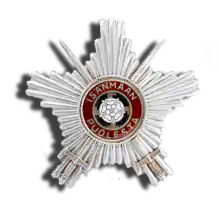 Order of the Cross of Liberty breast star with swords | |
| Awarded by | |
| Type | State order |
| Established | March 4, 1918 |
| Country | Finland |
| Seat | Defence Command, Helsinki[1] |
| Motto | Isänmaan puolesta ('For the Fatherland') |
| Eligibility | Finnish nationals and foreigners, Finnish Defence Force units and other organizations[2] |
| Criteria | Merits for the Finnish Defence Forces[2] |
| Status | Currently constituted |
| Founder | Carl Gustaf Emil Mannerheim |
| Grand Master | Sauli Niinistö |
| Chancellor | Ari Puheloinen[1] |
| Vice-Chancellor | Sakari Honkamaa[1] |
| Classes |
|
| Website | vapaudenristinritarikunta |
| Statistics | |
| First induction | Spring 1918[3] |
| Precedence | |
| Next (higher) | Order of the White Rose of Finland |
| Next (lower) | Order of the Lion of Finland |
Ribbon of the Order of the Cross of Liberty | |
The Order of the Cross of Liberty (Finnish: Vapaudenristin ritarikunta; Swedish: Frihetskorsets orden) is one of three official state orders in Finland, along with the Order of the White Rose of Finland and the Order of the Lion of Finland.
Organisation
The President of Finland is the Grand Master of the Order of the White Rose of Finland and of the Order of the Lion of Finland, and usually of the Order of the Cross of Liberty as well, Grand Mastership of which is attached to the position of Commander-in-chief.[2] All of these orders are administered by boards consisting of a chancellor, a vice-chancellor and at least four members. The orders of the White Rose of Finland and the Lion of Finland have a joint board.
History
The Order of the Cross of Liberty was founded on March 4, 1918,[4] upon the initiative of Carl Gustaf Emil Mannerheim. The Finnish artist Akseli Gallen-Kallela was commissioned to design the Order's insignia with the Old-Scandinavian Fylfot.
At its foundation there were seven classes: grand cross, cross of liberty (1st to 4th Class) and the medal of liberty (1st and 2nd Class). The decorations of the Order of the Cross of Liberty were initially conferred only in time of war. A decree was issued on 18 August 1944 enabling the decorations to be awarded in peacetime. Also in 1944, Mannerheim (1867–1951) was designated as Grand Master for life.[2]
Decorations of the order were awarded in great numbers during the World War II, partly due to Marshal Mannerheim having issued an order that wounded soldiers were to be awarded for their sacrifice, and Finland has no separate decoration for wounded. The Cross of Liberty is usually reserved for commissioned officers, with the Medal of Liberty being awarded for soldiers of junior rank and NCOs.
The Cross of Liberty has a red ribbon when it is granted in wartime and a yellow ribbon when it is awarded in peacetime. Associated with the Cross of Liberty is the Mannerheim Cross.
Classes
 The Presidential Standard of Finland has a Cross of Liberty, 3rd Class on its upper left corner |
The classes of the Order of the Cross of Liberty, in descending order, with abbreviations are:
- Grand Cross of the Order of the Cross of Liberty (VR SR)
- Cross of Liberty, 1st Class with a grand star (neck order) (VR 1. rtk)
- Cross of Liberty, 1st Class (neck order) (VR 1)
- Cross of Liberty, 2nd Class (VR 2)
- Cross of Liberty, 3rd Class (VR 3)
- Cross of Liberty, 4th Class (VR 4)
- Medal of Liberty, 1st Class (VM 1)
- Medal for Merit, 1st Class (VR Am 1)
- Medal of Liberty, 2nd Class (VM 2)
- Medal for Merit, 2nd Class (VR Am 2)
Other special decorations awarded during the Second World War include:
- Medal of Liberty 1st Class on Rosette Ribbon (only awarded once, to Field Marshal Mannerheim)[5]
- Gold Medal of Merit; only awarded once, to General Waldemar Erfurth, 13 June 1944[5]
- Cross of Mourning (VR sururisti); given to the nearest relative of a soldier killed in action[6]
- Medal of Mourning (VM surumitali); given to the nearest relative of a person killed in non-military duty of war industry or national defence.[6]
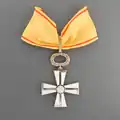 VR 1
VR 1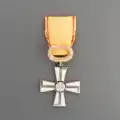 VR 2
VR 2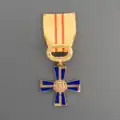 VR 3
VR 3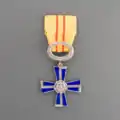 VR 4
VR 4 VR sururisti (Cross of Mourning)
VR sururisti (Cross of Mourning)
The awards above are for civilian accomplishments, signaled by the blue color in the 3rd and 4th Classes, and in peacetime, as shown by the yellow ribbon. Awards for military accomplishments in the 3rd and 4th Classes have a dark gray color replacing the blue, and are awarded with a red ribbon in wartime.
In total the order has 55 distinct insignia.[7] Due to the numerous ways of awarding it has been called "the most complex order in Europe".[8]
Notable recipients
Grand Crosses
- Martti Ahtisaari[9]
- Ion Antonescu[10]
- Walther von Brauchitsch[10]
- Stephan Burián von Rajecz[11]
- Prince Carl, Duke of Västergötland[11]
- Eduard Dietl[10]
- Karl Dönitz[10]
- Adolf Ehrnrooth[9]
- Hermann Göring[10]
- Tarja Halonen[9]
- Erik Heinrichs[9]
- Kaarlo Heiskanen[9]
- Prince Henry of Prussia[11]
- Georg von Hertling[11]
- Heinrich Himmler[10]
- Paul von Hindenburg[11]
- Gustav Hägglund[9]
- Kyösti Kallio[9]
- Juhani Kaskeala[9]
- Wilhelm Keitel[10]
- Urho Kekkonen[9]
- Jan Klenberg[9]
- Mauno Koivisto[9]
- Erich Ludendorff[11]
- Jarl Lundqvist[9]
- Carl Gustaf Emil Mannerheim[9]
- Vilho Petter Nenonen[9]
- Sauli Niinistö[9]
- Karl Lennart Oesch[9]
- Juho Kusti Paasikivi[9]
- Ari Puheloinen[12]
- Erich Raeder[10]
- Risto Ryti[9]
- Aarne Sihvo[9]
- Lauri Sutela[9]
- Pehr Evind Svinhufvud[9]
- Talaat Pasha[11]
- Jaakko Valtanen[9]
- Väinö Valve[9]
- Rudolf Walden[9]
- Wilhelm II, German Emperor[13]
1st Class with a Star
- Ernst Busch
- Wilhelm Canaris
- Rolf Carls
- Eduard Dietl
- Waldemar Erfurth
- Hans Jeschonnek
- Timo Kivinen
- Günther Korten
- Felix Steiner
1st Class
- Karl Allmendinger
- Hans Baur
- Gottlob Berger
- Wilhelm Berlin
- Karl Bodenschatz
- Franz Böhme
- Kurt Böhmer
- Theodor Burchardi
- Leopold Bürkner
- Erich Buschenhagen
- Hans Bütow
- Hans Degen
- Karl Maria Demelhuber
- Erwin Engelbrecht
- Kurt Fricke
- William R. Furlong
- Herbert Gille
- Rüdiger von der Goltz[14]
- Władysław Grabski
- Wilhelm Hasse
- Georg Ritter von Hengl
- Adolf Heusinger
- Otto Hoffmann von Waldau
- Alexander Holle
- Alfred Jodl
- Ferdinand Jodl
- Heinrich Kittel
- Philipp Kleffel
- Matthias Kleinheisterkamp
- August Krakau
- Hans Kreysing
- Karl von Le Suire
- Fanni Luukkonen
- Walter Nowotny
- Friedrich Paulus
- Georg Radziej
- Elisabeth Rehn
- Herbert Rieckhoff
- August Schmidt
- Hubert Schmundt
- Ferdinand Schörner
- Hans-Georg von Seidel
- Karl Weisenberger
- Albert Wodrig
- Kurt Zeitzler
- Arthur Zimmermann
2nd Class
- Eugen-Heinrich Bleyer
- Eckhard Christian
- Gerhard Engel
- Hans-Karl Freiherr von Esebeck
- Nikolaus von Falkenhorst
- Hermann Fischer
- Bruno Frankewitz
- Eberhard Kinzel
- Mauno Koivisto
- Rolf Nevanlinna
- Carl Petersén
- Erich Rudorffer
- Jorma Sarvanto
- Karl Schnörrer
- Reiner Stahel
- Alois Windisch
3rd Class
- Simo Häyhä
- Ilmari Juutilainen
- Paul Klatt
- Einar Lundborg
- Carl Petersén
- Jorma Sarvanto
- Reiner Stahel
- Mikko Hyppönen[9]
- Prince Wolfgang of Hesse
Other or unknown classes
Institutions
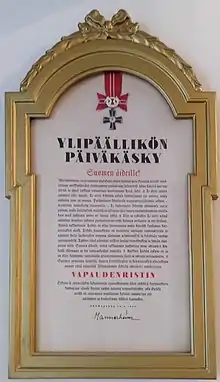
The statutes allow the order to be conferred collectively. The following have been awarded:
- City of Vaasa[15]
- White Guard of Finland[15]
- Karelian Guard Regiment[15]
- Guard Jaeger Battalion[15]
- Nyland Dragoon Regiment[15]
- Field Artillery Regiment 1[15]
- Nyland Regiment[15]
- Karelian Cavalry Jaeger Regiment[15]
- Pori Regiment[15]
- Vapaussodan Invalidien Liitto[15]
- Jaeger Battalion 1[15]
- Jaeger Battalion 2[15]
- Jaeger Battalion 3[15]
- Jaeger Battalion 4[15]
- University of Helsinki[15]
- Cadet School[15]
- Reserve Officer School[15]
- Mothers of Finland[15]
- City of Mikkeli[15]
- Naval Academy[15]
- Sotainvalidien Veljesliitto[15]
- National Defence Institute[16]
- Air Force Academy[16]
- Suomen sotaveteraaniliitto[16]
- Rintamamiesveteraanien liitto[16]
- Rintamanaisten Liitto[16]
- Sotilaskotiliitto[16]
See also
References
Notes
- 1 2 3 "Hallitus". Vapaudenristin Ritarikunta (in Finnish). Retrieved September 22, 2022.
- 1 2 3 4 "Asetus Vapadenristin ritarikunnasta. 550/1944". FINLEX (in Finnish). Retrieved September 23, 2022.
- ↑ Tiainen 2010, p. 25.
- ↑ Bergroth 2014, p. 46.
- 1 2 Tetri 1994, p. 47.
- 1 2 Tetri 1994, p. 49.
- ↑ Hieronymussen, Poul Ohm; Lundø, Jørgen, eds. (1968). Eurooppalaiset kunniamerkit värikuvina [Europæiske ordner i farver] (in Finnish). Translated by Karnila, Christer. Porvoo: WSOY. p. 108. OCLC 466954328.
- ↑ Matikkala 2017, p. 13.
- 1 2 3 4 5 6 7 8 9 10 11 12 13 14 15 16 17 18 19 20 21 22 23 24 25 Bergroth 2014, p. 320.
- 1 2 3 4 5 6 7 8 Matikkala 2017, p. 511.
- 1 2 3 4 5 6 7 Tiainen 2010, p. 29.
- ↑ "Puolustusvoimien entinen komentaja Puheloinen saa Vapaudenristin suurristin". MTVuutiset.fi (in Finnish). May 30, 2018. Retrieved February 3, 2023.
- ↑ Tiainen 2010, p. 28.
- ↑ Tiainen 2010, p. 30.
- 1 2 3 4 5 6 7 8 9 10 11 12 13 14 15 16 17 18 19 20 21 Castrén, Klaus (1982). "Yhteisöille suodut Vapaudenristit". Sotahistoriallinen aikakauskirja (in Finnish). 2: 205–217. ISSN 0357-816X.
- 1 2 3 4 5 6 Bergroth 2014, p. 329.
Sources
- Bergroth, Tom C. (2014). Vapaudenristin ritarikunta: Isänmaan puolesta (in Finnish) (2nd ed.). Helsinki: WSOY. ISBN 978-951-0-40498-0.
- Matikkala, Antti (2017). Kunnian ruletti: Korkeimmat ulkomaalaisille 1941–1944 annetut suomalaiset kunniamerkit (in Finnish). Helsinki: Suomalaisen Kirjallisuuden Seura. ISBN 978-952-222-847-5.
- Tetri, Juha E (1994). Kunniamerkkikirja (in Finnish). Ajatus. ISBN 951-9440-23-2.
- Tiainen, Jani (2010). Suomen kunniamerkit — The orders, decorations, and medals of Finland (in Finnish and English). Tampere: Apali. ISBN 978-952-5877-03-8.
Further reading
- Finnish Orders of Merit: 100 Years (PDF). Helsinki: National Archives of Finland, The Orders of the White Rose of Finland and the Lion of Finland, The Order of the Cross of Liberty. 2018. ISBN 978-952-7323-00-7.
External links
 Media related to Order of the Cross of Liberty at Wikimedia Commons
Media related to Order of the Cross of Liberty at Wikimedia Commons- The Order of the Cross of Liberty